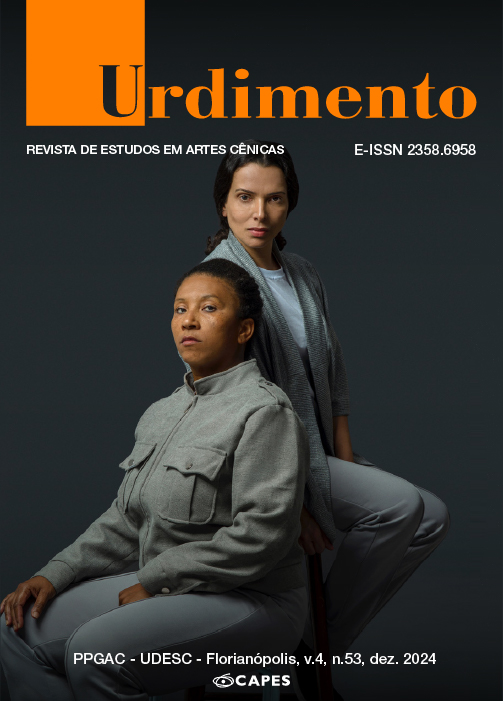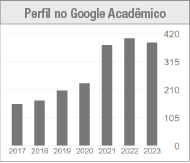From writing as a counterspell to a manifesto for performative writing at university
DOI:
https://doi.org/10.5965/1414573104532024e118Keywords:
performative Writing, performance, Renata Felinto, Grada Kilomba, academic writingAbstract
This publication is the combination of two performative texts from a doctoral research in Performing Arts that embody experiences and reflections of a body that moves between languages, fields and practices, works in collectives, guides, mentors, dances, writes and publishes collectively in the south of Brazil. Starting from a writing that testifies to the experience of the performative practices of Renata Felinto and Grada Kilomba to reveal the noise of the colonial wound in the bodies that live in this Westernized society, including this one who writes, and to move thoughts on the insurgency of discourses and practices in academia, both through their themes and the modes of writing.
Downloads
References
ADICHIE, Chimamanda Ngozi. Chimamanda Ngozi Adichie: O perigo da história única | TED Talk. 2014. Disponível em: https://www.ted.com/talks/chimamanda_ngozi_adichie_the_danger_of_a_single_story/transcript?language=pt. Acesso em: 8 set. 2024.
ALCOFF, Linda Martín. Uma epistemologia para a próxima revolução. Texto original "An epistemology for the next revolution", publicado em Transmodernity: Journal of Peripheral Cultural Production of the Luso-Hispanic World, v. 1, n. 2, 2011, p. 67-78. Trad.Cristina Patriota de Moura. Sociedade e Estado [online]. 2016, v. 31, n. 1 [Acessado 2 Maio 2022] , pp. 129-143. Disponível em: https://doi.org/10.1590/S0102-69922016000100007. Acesso em: 8 set. 2024.
AUSTIN, J. L. How to Do Things with Words. Oxford: Clarendon Press, 1962.
BAITELLO Jr, Norval. O pensamento sentado: sobre glúteos, cadeiras e imagens. São Leopoldo (RS), Unissinos, 2012.
CARNEIRO, Sueli. A construção do Outro como Não-ser como fundamento do Ser. Tese (Doutorado em Educação) - Universidade de São Paulo. São Paulo, 2005.
FELINTO, Renata, Axexê de A Negra ou o descanso das mulheres que mereciam serem amadas. Performance. São Paulo: 2017.
FELINTO DOS SANTOS, Renata Aparecida. A pálida História das Artes Visuais no Brasil: onde estamos negras e negros? 362 Revista GEARTE, Porto Alegre, v. 6, n. 2, p. 341- 368, maio/ago. 2019. Disponível em: http://seer.ufrgs.br/gearte . Acesso em: 14 set. 2024.
HARAWAY, Donna. Saberes localizados: a questão da ciência para o feminismo e o privilégio da perspectiva parcial. Cadernos Pagu, Campinas, SP, n. 5, p. 7–41, 2009. Disponível em: https://periodicos.sbu.unicamp.br/ojs/index.php/cadpagu/article/view/1773. Acesso em: 21 set. 2024.
KILOMBA, Grada. Desobediências poéticas/ Curadoria Jochen Volz e Valéria Piccoli. São Paulo: Pinacoteca, 2019a.
KILOMBA, Grada. Memórias da plantação. Editora Cobogó, 2019. Edição do Kindle.
KILOMBA, Grada. Descolonizando o conhecimento: Uma Palestra-Performance. Palestra proferida na Mostra Internacional de Teatro (MITsp). São Paulo: 2016. Tradução: Jessica Oliveira. Disponível em: https://joaocamillopenna.wordpress.com/wp-content/uploads/2018/05/kilomba-grada-ensinando-a-transgredir.pdf Acesso em: 21 set. 2024.
LOVELESS, Natalie. How to make art in the end of the world: a manifesto for research-creation. Durham (USA): Duke University Press, 2019.
MARTÍNEZ, Inma Garín. Artes Vivas: definición, polémicas y ejemplos. Estudis escènics: quaderns de l'Institut del Teatre de la Diputació de Barcelona. I, núm. 43. 2018.
RAMOS DO Ó, Jorge. Fazer a mão: por uma escrita inventiva da universidade. Lisboa (PT): Edições do Saguão, 2019.
SIMONE, Nina. I put a spell on you. Nova Iorque: Philips Records, 1965. Disponível em: https://www.youtube.com/watch?v=ua2k52n_Bvw&ab_channel=TheJazzStreet Acesso em: 14 set. 2024.
TAYLOR, Diana. O arquivo e o repertório: performance e memória cultural nas Américas. Belo Horizonte: Editora UFMG, 2013.
WILLIAM, Rodney. Apropriação cultural. São Paulo (SP): Pólen, 2019.
Published
How to Cite
Issue
Section
License
Copyright (c) 2024 Urdimento: Revista de Estudos em Artes Cênicas

This work is licensed under a Creative Commons Attribution 4.0 International License.
Copyright Statement
The articles published by the magazine are free to use. The copyright is all assigned to the magazine. The articles whose authors are identified represent the expression from the point of view of their authors and not the official position of the journal Urdimento. The author (s) undertakes whenever publishing material relating to the article published in Revista Urdimento mention the said publication as follows: This article was originally published by Urdimento magazine in its volume (put the volume), number (put the number) in the year of (put the year) and can be accessed at:
http://www.revistas.udesc.br/index.php/urdimento
This work is licensed under a Creative Commons Attribution 4.0 International License.




